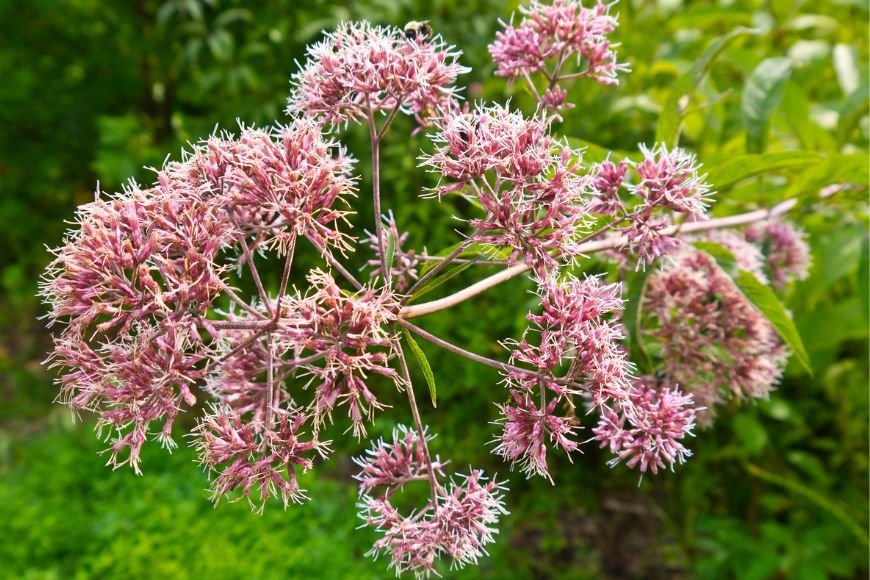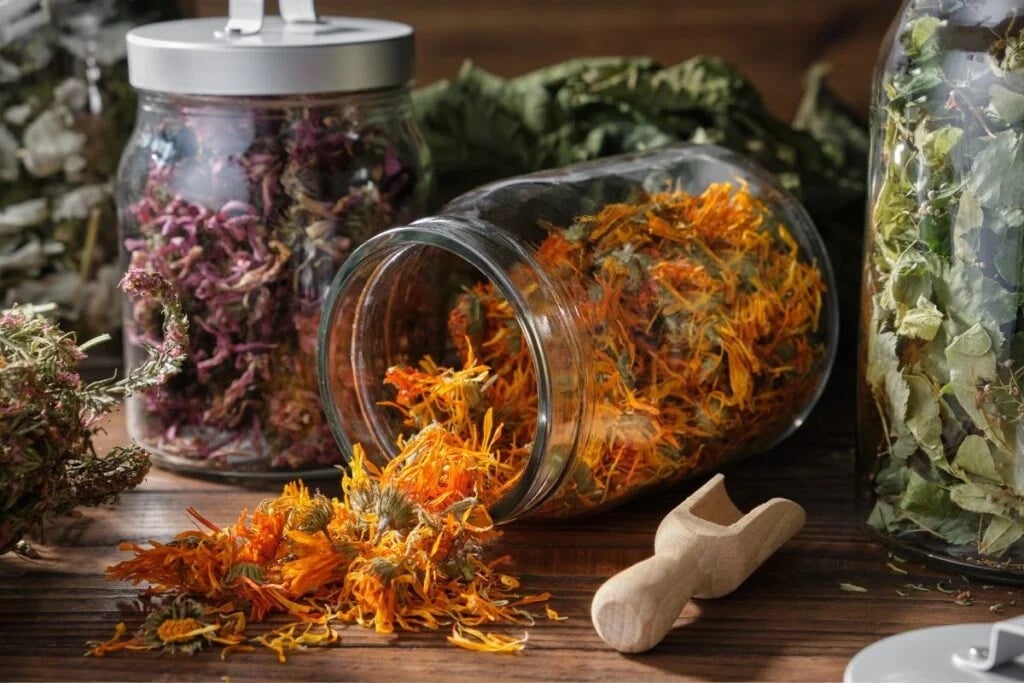Joe Pye weed is more than just a pretty face for pollinators and a low-maintenance plant with fragrant blooms for gardeners.
Originating from North America, this cultivar has tons of historic medicinal uses. It’s known to help with kidney stones, fevers, and other conditions.
You’re probably thinking: What are the Joe Pye weed uses? And is it safe to consume?
That’s what we’ll tell you in this article! So, grab a cup of your favorite tea and keep reading to find out everything you need to know about this magical plant.
Let’s dive into the details.
The History of the Magical Weed
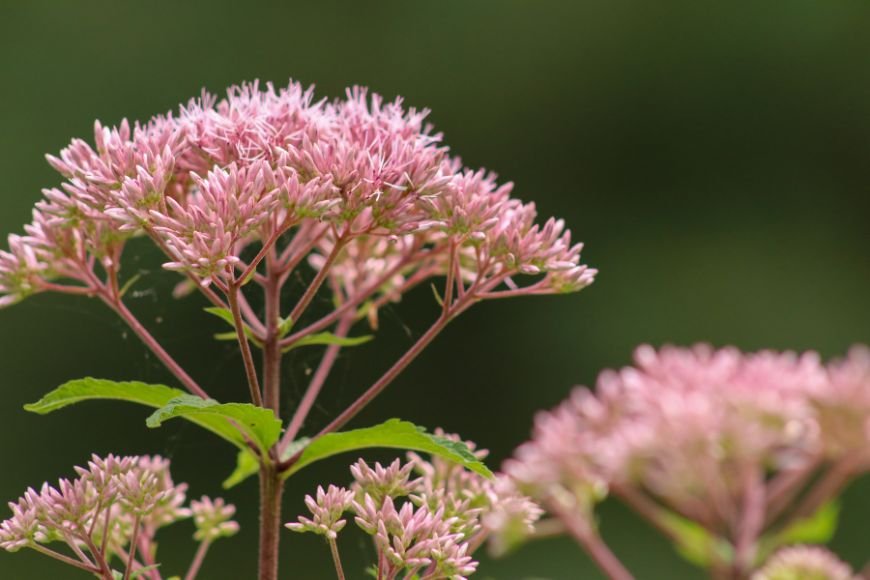
Joe Pye weed originates from North America. Some say the plant got its name from the Native American medicine man who discovered its properties, Joseph Shauquethqueat. Yet, many historians recommend that we take this story with a grain of salt.
The plant is also known by many other names, including purple boneset, gravel root, kidney root, and queen of the meadow.
Aside from its name, this potent weed proved to be effective against many conditions. It became widely known after doctors started using it to treat European settlers in Massachusetts suffering from typhoid.
Later on, in 1818, gravel root gained more recognition. Amos Eaton, a renowned botanist, mentioned the plant for the first time in his book, Manual of Botany for the Northern and Middle States of America.
In his book, Eaton stated that Joe Pye tea might be effective for curing fever.
Purple Boneset Flavor Profile
After preparing your tea, you’ll notice it has a sweet, honey-like aroma with hints of vanilla.
So, what does a cup of purple boneset tea taste like?
Well, with the first sip, you’ll taste some earthy notes. It’s almost similar to old hay, but it’s not overwhelming.
When you take another sip, your taste buds will detect some floral notes that tangle in your mouth for a while. In the background, you’ll start noticing some light bitterness.
A cup of purple boneset will likely leave you with an earthy, slightly bitter aftertaste. It’s similar to that of caraway tea. I don’t know about you, but I tend to enjoy this bold aftertaste!
Purple Boneset Weed Uses and Possible Benefits
Here are some of the possible benefits and uses of these medicinal herbs:
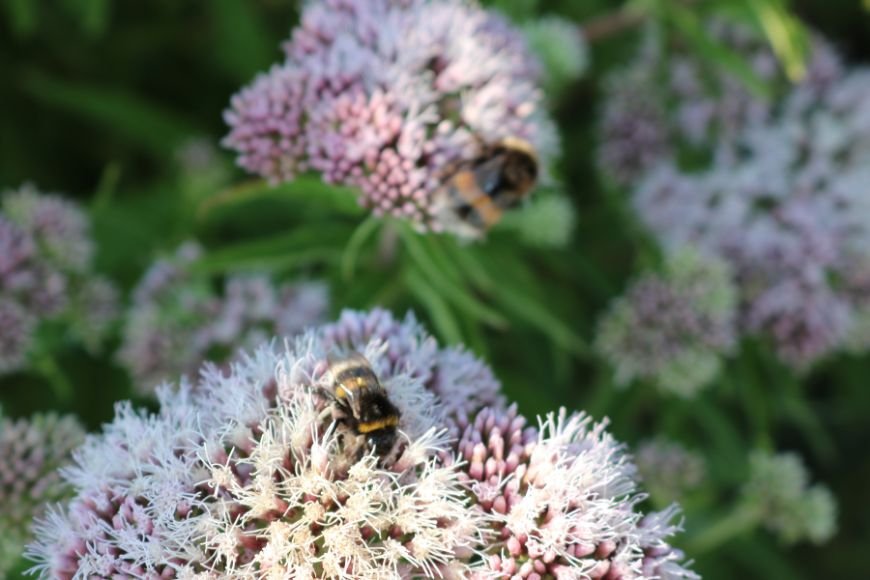
1. Might Reduce Inflammation
Boneset weed can help reduce inflammation associated with different conditions. Yet, there isn’t enough scientific research to confirm this claim.
2. Can Help With Common Cold
If you’re struggling with a nasty cold, a cup of purple boneset might help relieve the tiring symptoms. Early research shows promising results for Eupatorium perfoliatum D2, a chemical made from boneset, to reduce common cold symptoms.
3. May Treat Some Urinary Tract Conditions and Diseases
This plant is known as “kidney root” for a reason. Joe Pye root tea is a traditional treatment for various urinary tract conditions. It can help with kidney stones, painful urination, and some bladder infections.
4. Might Dissolve Gallstones
Looks like kidney stones aren’t the only things that purple boneset can dissolve. In folk medicine, gravel root tea can dissolve existing gallstones and prevent the formation of new ones.
5. Can Help With Fever
The reason why purple boneset became so popular was its ability to treat fever. To this day, people still use it for this purpose.
6. Has Diuretic Properties
Native Americans used Joe Pye weed tea as a diuretic for different conditions. So, it can be a good option in cases of high blood pressure and fluid retention.
Still, if you’re suffering from these conditions, please contact your healthcare provider before consuming purple boneset.
Purple Boneset Possible Side Effects and Precautions
Before you prepare a cup of these delicious herbs, there are some things you need to know about:
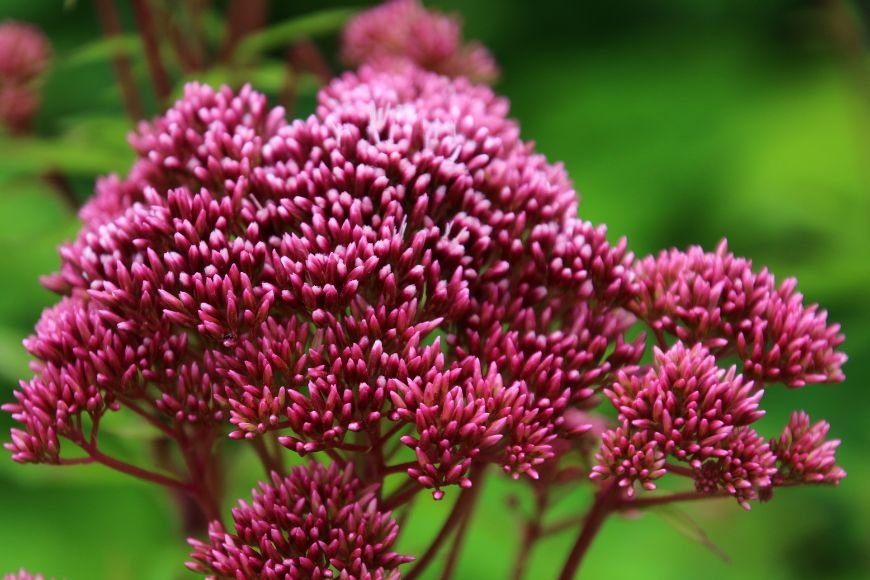
Precautions
The problem with the purple boneset is that it contains pyrrolizidine. This substance is an alkaloid that causes liver damage.
So, drinking a lot of this tea in a short period can be dangerous. That doesn’t mean a cup of gravel root is harmful to a normal person.
But it does mean that people suffering from any liver condition or disease shouldn’t consume this tea, at least not without consulting their healthcare provider.
That also means that it’s possibly unsafe for pregnant and breastfeeding women. Additionally, if you have an allergy to any plants in the Asteraceae/Compositae family, you should be careful when drinking this tea.
Possible Side Effects
Consuming a large amount of this weed can lead to vomiting, headaches, and excessive urination.
Drug Interactions
Since it’s a potent herb, it might interact with certain drugs in your system. The active constituents in the tea might increase the activity of certain drugs, like lithium.
That’s because it alters the mechanism that your body uses to get rid of the drug. As a result, you might suffer from side effects.
Here are some other drugs that might interact with boneset:
- Carbamazepine
- Phenobarbital
- Phenytoin
- Rifampin
- Rifabutin
If you’re administering any of these drugs, consult your healthcare provider before consuming any Joe Pye products.
The Safe Dose of Joe Pye Weed
The safe dose of Joe Pye weed can depend on many factors, like your age and the condition of your liver. So, it’s hard to tell the exact amount of herbs you can administer before experiencing side effects.
All in all, a cup of purple boneset every once in a while won’t hurt. You can also drink one when you’re having a fever or struggling with kidney stones.
Wrapping Up
So, what are the Joe Pye weed uses?
These magical flower clusters have highly beneficial medicinal qualities. The Purple boneset can treat fever and various urinary tract issues, such as kidney stones.
The problem is that, in high doses, it can be toxic to your liver. As a result, you shouldn’t drink purple boneset tea without consulting a medical professional if you’re struggling with any liver condition.
It’s also not the safest option for pregnant and breastfeeding women. Other than that, a cup of sweet Joe Pye weed tea every once in a while won’t hurt. So, enjoy sipping on that delicious tea!
